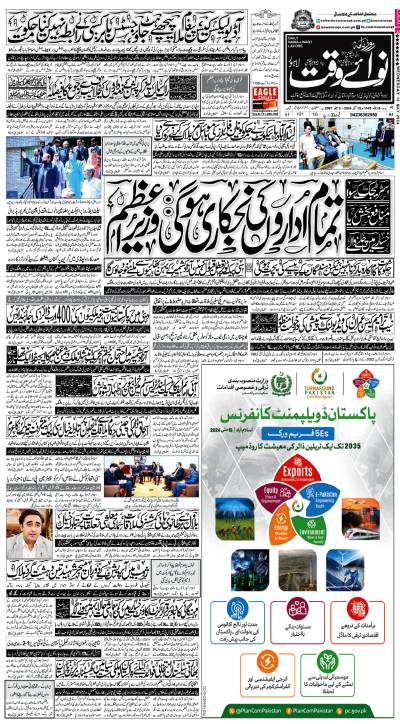Finance minister says budgetary measures will help resume development-journey halted after 2018
n Fiscal deficit will be decreased by Rs 300 billion after amendments: Ishaq Dar n Petroleum development levy increased to Rs60 per litre from Rs50.
ISLAMABAD - The National Assembly passed the Finance Bill 2023-24 with certain amendments on Sunday in order to meet the tough conditions set by the International Monetary Fund with the total outlay of Rs14.48 trillion to achieve macroeconomic stability. The government has set the target of a 3.5 Gross Domestic Product (GDP) growth rate for the next fiscal year.
The Finance Bill, moved by Minister for Finance and Revenue Senator Mohammad Ishaq Dar, was passed with majority vote after clause-by-clause reading. The House echoed with desk thumping as the House passed the budget.
The passage of the Finance Bill successfully brought to an end the budgetary process started on June, 9 with the budget speech of the finance minister at the National Assembly.
The bill now would go to the President for assent who will sign it into a law, and effective from July 1, 2023.
Speaker National Assembly Raja Pervaiz Ashraf put all the amendments proposed by lawmakers Maulana Abdul Akbar Chitrali, Saira Bano, Nisar Cheema, Zahra Wadood Fatimi, Nawab Sher Waseer, Asiya Azeem, which were rejected with a majority vote; except Maulana Abdul Akbar Chitrali’s amendment, which was included in the bill by the Assembly’s approval.
Consequently, the amendment proposed by MQM member Salahuddin was also rejected by the House.
In the light of Senate recommendations, the National Assembly also approved the amendments proposed in the Finance Bill 2023-24 by the Finance Minister.
The bill, presented in the House on June 9 by the Finance minister for consideration, got the approval of the National Assembly with certain changes in the figures related to revenue targets and other matters in the budget for the upcoming fiscal year.
Accordingly, the revenue target of the Federal Board of Revenue (FBR) had increased from Rs 9.2 trillion to Rs 9.415 trillion, provincial revenue from Rs 5.276 trillion to Rs5.39 trillion, federal government expenditures from Rs 14.46 trillion to Rs 14.48 trillion, the pension volume from Rs 761 billion to Rs 801 billion, the subsidy volume would stand at Rs1.064 trillion and the grants volume at Rs. 1.405 trillion.
As a result of all these measures, improvements would be seen in the budget’s deficit, and the fiscal deficit would decrease by Rs 300 billion.
Later, the finance minister thanked the lawmakers and the government allies and the staff of supporting departments for the smooth conduct of the special budget session and subsequent passage of the fiscal plan for the year 2023-24.
He expressed confidence that the budgetary measures would help resume the development-journey which faced a complete halt after 2018.
He said the country, under the dynamic leadership of Prime Minister Shehbaz Sharif had succeeded in achieving economic stability and started moving towards a consistent path of progress and development, adding, the process of economic decline has stopped. “Our next goal is to begin the journey of progress for which solid proposals have been given in the budget,” he added.
Ishaq Dar explained that yesterday, his statement regarding the special Hajj flights was presented in the media and social media in an incorrect manner, adding all lawmakers were going to perform the religious obligation at their own expenses.
He said the Saudi government had stopped further Hajj flights, but Pakistan requested the Saudi government to allow one flight enabling the lawmakers, participating in the ongoing budget session, to reach the holy land for the Hajj. The minister announced honorarium equal to three basic salaries for all the government employees deputed to perform the special budget session duties in the Parliament premises.
Under the $6.5 billion facility’s ninth review of the Fund, negotiated earlier this year, Pakistan has been trying to secure $1.1 billion of funding stalled since November.
The Rs14.48 trillion budget was passed during a session that lacked quorum, with only 70 lawmakers on the treasury benches and two on the opposition benches. When Dar presented the budget on June 9, he announced new revenue measures of Rs223bn in addition to all taxes worth Rs500bn introduced in a mini-budget in mid-February. The sum of new tax measures for the coming fiscal year now stands at Rs938bn.
The government hopes to achieve a 28pc higher revenue target for the next fiscal year based on projected economic growth of 3.5pc, average inflation of 21pc and revenue measures.
A total of nine amendments were introduced in the Finance Bill 2023-24 - eight of the government while one of the opposition - and all were approved.
Finance Minister Ishaq Dar also presented an amendment to the Petroleum Development Levy Ordinance which was approved by the House with a majority vote. In the amendment, the petroleum development levy limit was increased from Rs50 per litre to Rs60 per litre.
Opposition member Maulana Abdul Akbar Chitrali’s amendment, authorising the chairman standing committee to use a 1200 cc vehicle, was also accepted. The government did not oppose the opposition member’s amendment. Earlier, 1300 cc to 1600 cc vehicles were allowed.






